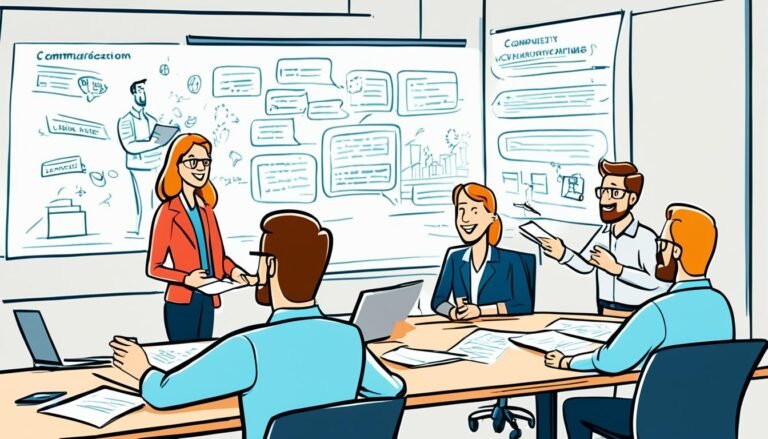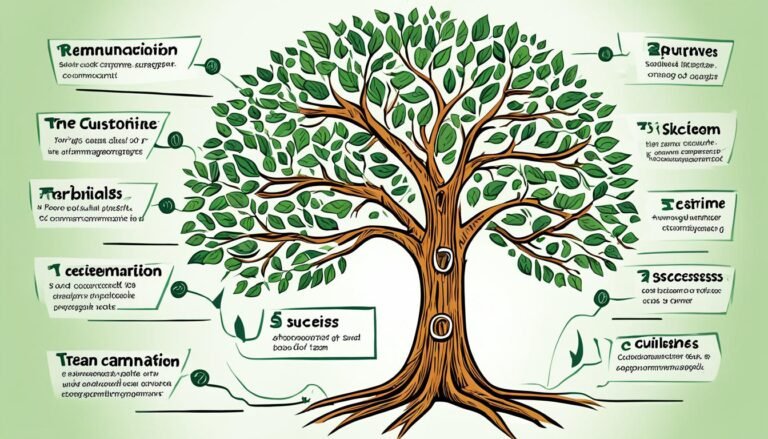Negotiation and Conflict Resolution as a Soft Skill
Mastering negotiation and conflict resolution as a soft skill is important for maneuvering today's professional world. Understanding the importance of soft skills like emotional intelligence, active listening, and empathy enhances conflict management. These skills help in grasping emotions and motivations during negotiations, fostering a collaborative environment for smoother resolutions. Developing effective communication strategies, building trust, and employing win-win negotiation techniques are essential. Remember, honing these skills can greatly impact your ability to handle conflicts and negotiations successfully, leading to positive outcomes in various situations.
Key Takeaways
- Soft skills are essential for effective negotiation and conflict resolution.
- Emotional intelligence enhances understanding and managing emotions in conflicts.
- Active listening and empathy improve communication and conflict management.
- Developing soft skills fosters collaboration and smoother resolutions.
- Prioritizing empathy, communication, and emotional regulation is crucial in conflict resolution.
Importance of Soft Skills
Understanding the importance of soft skills in negotiation and conflict resolution is essential for achieving successful outcomes in various situations. Emotional intelligence plays a vital role in maneuvering through challenging conversations and finding mutually beneficial solutions. Developing soft skills, such as active listening, empathy, and effective communication, can greatly enhance your ability to manage conflicts and negotiate effectively.
When you prioritize soft skills development, you equip yourself with the tools needed to comprehend the emotions and motivations of yourself and others involved in the negotiation process. This heightened awareness allows you to approach discussions with empathy and perspective, fostering a more collaborative environment where resolutions can be reached more smoothly.
Understanding Conflict Dynamics
To navigate conflict effectively, recognizing the underlying dynamics is essential for fostering constructive dialogue and reaching positive resolutions. Conflict dynamics refer to the interplay of factors that contribute to the escalation or de-escalation of conflicts. Understanding these dynamics is pivotal in conflict resolution and negotiation processes. Here is a table highlighting key conflict dynamics:
| Conflict Dynamics | Description | Importance |
|---|---|---|
| Communication | Verbal and non-verbal interactions | Vital for understanding needs |
| Power Imbalance | Variance in authority or resources | Influences negotiation |
| Emotional Triggers | Personal sensitivities and triggers | Impact on conflict intensity |
| Cultural Differences | Diverse backgrounds and perspectives | Understanding perspectives |
Effective Communication Strategies
Efficient communication strategies play an essential role in managing conflicts and fostering positive resolutions. When engaging in conflict resolution, active listening is key. By actively listening to the concerns and perspectives of all parties involved, you demonstrate empathy and respect, creating a conducive environment for productive discussions. Through active listening, you can gain a deeper understanding of the underlying issues at hand, paving the way for effective negotiation tactics.
In negotiations, the way you communicate can greatly impact the outcome. Using clear and concise language can help avoid misunderstandings and confusion. Additionally, being mindful of your tone and body language can convey openness and willingness to collaborate. Acknowledging the emotions of others and responding in a respectful manner can build trust and rapport, essential elements for successful conflict resolution.
Building Trust and Empathy
When fostering positive resolutions and managing conflicts, establishing trust and empathy is essential. Building rapport with others through active listening and showing genuine interest in their perspectives can go a long way in creating a conducive environment for negotiation and conflict resolution.
By fostering understanding and demonstrating empathy towards the concerns and emotions of those involved, you can lay a solid foundation for effective communication and collaboration. Trust is a crucial component in any relationship, and it's no different when it comes to resolving conflicts. Being transparent, reliable, and consistent in your actions can help build trust with others and pave the way for constructive dialogue.
Empathy, on the other hand, allows you to see things from the other person's point of view, fostering a sense of connection and mutual respect. By prioritizing the establishment of trust and empathy in your interactions, you can create a positive atmosphere that encourages cooperation and facilitates the resolution of conflicts.
Win-Win Negotiation Techniques
Implementing win-win negotiation techniques involves understanding the interests and needs of all parties involved to find mutually beneficial solutions. Empathy building plays an important role in this process, as it helps you see things from the perspective of the other party. By actively listening and acknowledging their concerns, you can create a more cooperative atmosphere for negotiation.
When it comes to negotiation tactics, it's vital to focus on creating value for both sides rather than seeking to win at the expense of the other. Brainstorming with the other party to generate multiple options can lead to creative solutions that satisfy everyone's needs. Be open to exploring different possibilities and be willing to compromise without compromising your principles.
Handling Difficult Conversations
When faced with difficult conversations, it's important to utilize active listening techniques to show understanding and empathy.
Employing de-escalation strategies can help in diffusing tensions and finding common ground.
Remember to stay calm, focused, and respectful throughout the conversation to facilitate a constructive resolution.
Active Listening Techniques
To navigate difficult conversations effectively, mastering active listening techniques is pivotal. Empathy building and rapport development play vital roles in creating a productive dialogue.
When engaging in challenging discussions, focus on truly understanding the other person's perspective. Show genuine interest through nonverbal cues like maintaining eye contact and nodding. Reflect back on what the speaker is saying to demonstrate that you're actively listening and comprehending their words.
Avoid interrupting and allow the speaker to express themselves fully before responding. By practicing active listening, you create a safe space for open communication and establish a foundation of trust. These techniques can help de-escalate tense situations and foster constructive resolutions.
De-escalation Strategies
In handling difficult conversations, employing effective de-escalation strategies is crucial for fostering understanding and reaching constructive resolutions. Conflict resolution hinges on your ability to navigate emotionally charged interactions with finesse. When tensions rise, focus on active listening and maintaining a calm demeanor.
Acknowledge the other person's feelings and perspectives without necessarily agreeing with them. Use phrases like 'I understand where you're coming from' to show empathy and validate their emotions. Encourage open communication by asking clarifying questions and confirming their points to make certain you grasp their concerns accurately.
Conflict Resolution in Teams
Conflict resolution in teams requires open communication and a willingness to collaborate towards finding mutually beneficial solutions. When conflicts arise within a team setting, it's essential to address them promptly and effectively to maintain a positive working environment.
Here are some key points to contemplate:
- Understanding Team Dynamics: Recognize the unique dynamics within your team, including individual personalities, communication styles, and roles. Ponder how these dynamics may impact the conflict resolution process.
- Implementing Conflict Resolution Strategies: Utilize proven conflict resolution strategies such as active listening, compromise, and seeking common ground. Encourage team members to express their perspectives openly and respectfully.
- Promoting a Collaborative Environment: Foster a culture of collaboration and mutual respect within the team. Emphasize the importance of working together towards shared goals and finding solutions that benefit everyone involved.
- Seeking Mediation if Necessary: If conflicts persist or escalate, consider involving a neutral third party to mediate the situation. A mediator can help facilitate constructive dialogue and guide the team towards a resolution.
Role of Emotional Intelligence
Understanding the role of emotional intelligence is important in managing interpersonal dynamics and fostering effective communication within a team environment. Emotional regulation plays a pivotal part in steering conflicts and negotiations. By being able to regulate your emotions, you can approach discussions with a clear and level-headed mindset, which can lead to more constructive outcomes.
Social awareness is another key aspect of emotional intelligence that comes into play during negotiations and conflict resolution. Being attuned to the emotions and perspectives of others allows you to communicate more effectively and find common ground.
Emotional intelligence helps in recognizing and understanding the emotions of both yourself and others involved in the negotiation or conflict. This awareness can prevent misunderstandings and help you address underlying issues more efficiently. By practicing emotional regulation and social awareness, you can create a more harmonious team environment where conflicts are resolved amicably, and everyone feels heard and valued.
Conflict Prevention and Management
When it comes to conflict prevention and management, remember the importance of early conflict detection.
Utilizing effective communication strategies can help you navigate challenging situations with grace.
Collaborative problem-solving techniques can foster understanding and lead to mutually beneficial resolutions.
Early Conflict Detection
Effective conflict resolution begins with the early detection of underlying tensions and issues before they escalate into more serious disputes. Early intervention and conflict prevention are crucial components in maintaining a harmonious environment.
Here are four key strategies to help you detect conflicts early on:
- Active Listening: Pay close attention to verbal and non-verbal cues to understand the underlying emotions.
- Encouraging Open Communication: Create a safe space for individuals to express their concerns freely.
- Regular Check-ins: Schedule periodic meetings to address any emerging issues promptly.
- Conflict Resolution Training: Equip team members with the necessary skills to manage conflicts effectively.
Effective Communication Strategies
To foster effective communication and prevent conflicts, it's important to establish clear channels of dialogue within the team. Vital listening plays a critical role in understanding others' perspectives and feelings. By actively listening to your team members, you demonstrate empathy and build stronger connections.
Empathy building is another key component in effective communication. Putting yourself in someone else's shoes can help you see situations from different angles and find common ground.
Encouraging open and honest communication within the team creates a safe space for expressing thoughts and emotions. Remember, effective communication is a two-way street that requires listening as much as speaking.
Practice active listening and empathy building to enhance your communication skills and prevent conflicts.
Collaborative Problem-Solving Techniques
Utilizing collaborative problem-solving techniques is essential for effectively managing conflicts within a team. When conflicts arise, it's important to approach them with a mindset geared towards finding solutions that benefit everyone involved. Here are four key points to take into account:
- Brainstorming Solutions: Encourage team members to freely share their thoughts and ideas on how to resolve the conflict.
- Group Facilitation: Assign a neutral facilitator to guide the problem-solving process and make sure that everyone has a chance to voice their perspective.
- Active Listening: Emphasize the importance of actively listening to others without interrupting, to fully understand different viewpoints.
- Consensus Building: Work towards reaching a consensus where all team members agree on the proposed solution, promoting team cohesion and collaboration.
Conclusion
In summary, mastering negotiation and conflict resolution as a soft skill is vital in today's professional world. Did you know that 85% of employees deal with workplace conflict to some extent?
By refining these skills, you can navigate challenging situations with ease, build stronger relationships, and contribute to a more harmonious work environment. Remember, conflict is inevitable, but how you handle it can make all the difference.
Keep practicing and improving your skills, and watch your career flourish.








